On-going Projects

SALUS Project (Horizon EU-101225719)
Strengthening law enforcement with advanced IoT forensic tools and enriched investigation schemes,
realised by a Software Defined Network Security-as-a-Service architecture
01/11/2025 – 31/10/2028
HMU role in the project: Project Coordinator & Work Package Leader
Total budget (EU contribution): € 4.999.077,50
Funding Scheme: Horizon – RIA- Horizon Research &Innovation Actions
 SALUS
SALUS
SALUS addresses the growing security challenges of IoT systems by providing law enforcement with (i) new forensic investigation schemes and policies, and (ii) advanced IoT forensic tools for threat detection, evidence collection, and cross-agency collaboration,
all while ensuring compliance with EU legal and ethical frameworks. To implement this, the project combines a novel Digital-Twin (DT) infrastructure for proactive threat simulation, a secure Software Defined Network-enabled IoT architecture (SDaaSS) acting as the
backbone of the DT for dynamic policy enforcement, and AI-powered forensic capabilities for real-time IoT device detection, lawful evidence interception, and blockchain-based chain of custody. Validated through five diverse pilot use cases in collaboration with five
(5) police authorities and two (2) critical infrastructure providers (hospitals and nuclear power plants), SALUS bridges technology and operational needs to enhance security in critical infrastructures and IoT ecosystems. The above technological developments will be
closely accompanied by activities concerning: i) incorporation of legal and ethical aspects, including fundamental rights, privacy, personal data, etc, ii) integration of operational aspects, alignment with relevant EU cybersecurity policies, analysis of modus operandi, lawful evidence exploitation, and delivery of policy recommendations for tackling new and emerging forms of IoT-related crime, all aimed atimproving police authorities’ understanding, iii) development of multi-dimensional, comprehensive practitioner training activities and joint exercises, tailored to the organization of operational-level hackathon activities, iv) Development of investigation, technological and security standards, and v) Establishment of a synergistic ecosystem among related national and EU-funded projects, as well as stakeholders from the law enforcement community.
Read More: salus-project.eu/

INTACT Project (Horizon EU-101168438)
Integrated software toolbox for secure IoT-to-Cloud computing
01/10/2024 – 30/09/2027
HMU role in the project: Task Leader
Total budget: € 7.080.270,
(EU contribution): € 5.644.566,75
Funding Scheme: Horizon – RIA- Horizon Research &Innovation Actions
 INTACT
INTACT
We will develop an Integrated Software Toolbox that will offer predictive Cybersecurity sensing, optimization and management services for the distributed IoT-to-Cloud continuum. The scope is to continuously maximizing the continuum’s infrastructure security and data
privacy with minimal effect on its computing capacity, energy consumption, monetary costs, etc. that are necessary for the businesses to run. To do so, Twinning tools will be replicating the continuum as virtual (isolated) dataspaces, such that Threat Intelligence tools can
stress-test the attack-surface of these dataspaces and predict optimal risk mitigation measures accurately and safely (i.e. pre-emptively protecting and without affecting the real system operation), subject to certain computing, energy, etc. thresholds set by the end-user.
Scalability & Interoperability of services and data will be achieved via the use of open standards & APIs (including Eclipse Connector), while AI Automation will be embedded in all Toolbox processes. Identity & Access Management will be advanced over a zero-trust
distributed computing pipeline covering all Hardware-, System-, and Application-level security. An initial Lab-testbed with matured DevSecOps & ML/Data-Ops stemming from previous EU Actions will lead our developments roadmap to 4x + 1 final TRL7 operational
deployments that will be validated over 1st & 2nd Stage Demos covering use cases related to Telcos, Health 4.0, Transportation, Safety-critical Nuclear Infrastructures, and Smart Cities (cross-vertical supply-chain assessments). The impact will not only safeguard EU
position in data security, economy and applications verticals, but lower energy efficiency and CO2 footprint. Sustainability & Industry acceptance will be achieved via open source ecosystems, standardization involvement, and a dedicated Portal for linking our dataspaces
to EU Data Spaces (GAIA-X, IDSA, etc) and our innovations to EU Bodies related to Cybersecurity, AI, IOT and Robotics.
Read More: intact-horizon.eu/

CSSBoost Project (Horizon EU-101135275)
01/06/2024 – 30/11/2027
HMU role in the project: Work Package Leader
Total budget (EU contribution): € 11.267.312,50
Funding Scheme: Horizon – IA – HORIZON Innovation Action
 CSSBoost
CSSBoost
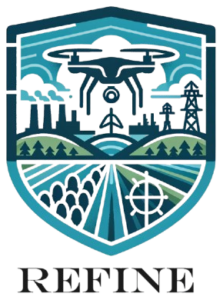
REFINE Project (H2022-101129910)
Real Time Fine-gained Air Quality Monitoring with Intelligent and Robust Multi-UAV Networks
1/01/2024 – 31/12/2027
HMU role in the project: Work Package Leader
Total budget (EU contribution): € 584.200,00
Funding Scheme: Horizon-TMA-MSCA-SE – HORIZON TMA MSCA Staff Exchanges
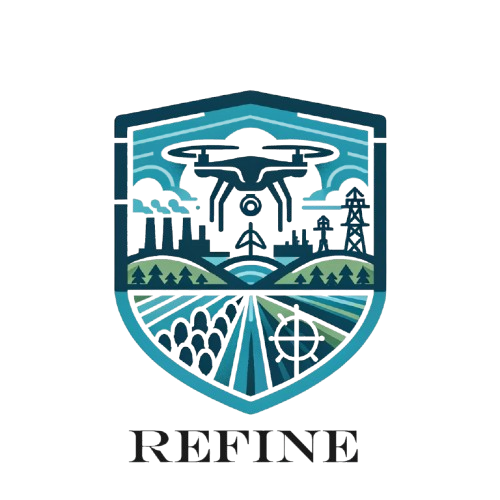 REFINE
REFINE
Air pollution is a significant global concern causing an estimated 4.2 million deaths annually due to diseases related to poor air quality. Climate change is exacerbating air quality issues and posing unprecedented challenges to the existing air quality monitoring systems, which mainly utilize sparse and expensive terrestrial stations and satellites, leading to limited accuracy and flexibility. To address these challenges, REFINE aims to form an international, multidisciplinary, and cross-sectoral consortium with world-leading researchers to create a novel real-time fine-grained air quality monitoring system empowered by advanced technologies in Unmanned Aerial Vehicles (UAVs), Artificial Intelligence (AI), and Wireless Networking. Specifically, REFINE will pioneer research and innovations (R&I) on ground-breaking technologies including: 1) a robust and scalable system architecture for aerial-terrestrial air quality monitoring; 2) intelligent and efficient multi-UAV cooperation strategies for dynamic and flexible area coverage; 3) ultra-resilient and secure aerial- terrestrial networking schemes for reliable and efficient data transmission; 4) lightweight and robust AI methods for accurate and real-time air quality analysis. REFINE will establish a long-term cross-disciplinary and cross-sectoral knowledge-sharing platform with competent and complementary expertise in Computer Science, Environmental Science, and Communication Engineering. The researchers involved will be trained through substantial R&I actions and well-planned networking activities at both European and global levels to enrich their skills and enhance their career perspectives. REFINE will significantly contribute to achieving the EU’s zero-pollution ambition and enhancing European competitiveness, through transforming the current air quality monitoring systems into a new generation, which is able to provide real-time intelligent monitoring of vast rural areas with higher precision and efficiency.
Read More: https: www.msca-refine.eu/

PQ-React Project (H2022-101119547 )
Post Quantum Cryptographic Framework for Energy Aware Contexts
1/11/2023 – 31/8/2026
HMU role in the project: Task Leader
Total Budget (EU contribution): € 4.935.859,50
Funding Scheme: Horizon-IA – Horizon Innovation Actions
 PQ-React
PQ-React
In the last three decades, public key cryptography has become an indispensable component of global communication digital infrastructure. These networks support a plethora of applications that are important to our economy, our security, and our way of life, such as mobile phones, internet commerce, social networks, and cloud computing. In such a connected world, the ability of individuals, businesses and governments to communicate securely is of the utmost importance. At the moment, the quantum threat is theoretical as quantum computers that fulfill the requirements of Shor’s and Grover’s algorithms for long keys are not available, but it is evident that widely used RSA, ECDSA, ECDH, and DSA cryptosystems will need to be replaced by post-quantum cryptography (PQC). The need for addressing this problem early enough has been recognized by various relevant organizations and the National Institute of Standards and Technology (NIST) has started an effort to identify cryptographic algorithms able to withstand quantum computer attacks by 2022 — and make them available by 2024. The main objective of PQ-REACT project is to design, develop and validate a framework for a faster and smoother transition from classical to post-quantum cryptography for a wide variety of contexts and usage domains, while leveraging Europe’s most powerful Quantum infrastructure (IBM Quantum Computer from Fraunhofer FOKUS). This framework will include PQC migration paths and cryptographic agility methods and will develop a portfolio of tools for validation of post quantum cryptographic systems, that will allow users to switch to post-quantum cryptography, taking under consideration their individualities and various contexts and a wide variety of real world pilots, i.e., Smart Grids, 5G and Ledgers. The project will also foster a series of open calls for SMEs and other
stakeholders to bring and test their PQC algorithms and external pilots on the PQ-REACT, Quantum Computing Infrastructure.
Read More: https://pqreact.eu/

Emerge Project (H2020-101008701)
Emerging Printed Electronics Research Infrastructure (EMERGE)
1/07/2021 – 30/6/2025
HMU role in the project: Work Package Leader
Total Budget (EU contribution): € 6.177.816
Funding Scheme: RIA – Research and Innovation Action
 Emerge
Emerge
The EU-funded EMERGE project addresses the challenges concerning the whole spectrum of flexible, large-area electronics and photonics development: from materials synthesis and process design and architecture to device and system development. EMERGE will establish the first research infrastructure that supports interdisciplinary research in the field, enabling the introduction of new, recyclable electronics products at half the time and cost. Moreover, it will establish guidelines for the further exploitation of industrial symbiosis of green technologies by identifying best practices and maintaining an up-to-date inventory of projects and opportunities for cross-sectoral cooperation and networking.

The aim of EMERGE is to establish the first integrated, distributed research infrastructure supporting comprehensive user projects for multi-and-trans-disciplinary research on sustainable flexible large-area printed electronics and photonics (FLAPEP) value chain, going from materials formulation to design and architecture ofprocesses, devices and systems, backup by characterization, test modelling and simulation tools, through a coordinated open-access for RTOs, industry and SMEs to complementary facilities. This is a route for creating added value and road mapping the introduction of new, recyclable electronics products at “Half-the-time/ Half-the-cost” to establish a sustainable prosperity, as required by today’s science and technology challenges and ESFRI landscape analysis.
The overall objective of EMERGE is to provide access for users working with materials such as paper, textiles or biocompatible polymers to small-footprint FLAPEP technologies which enables emerging devices by using industrially compatible hybrid printing processes (roll-to-roll (R2R), functional 3D printing, etc.) accompanied with in-line inspection tools and automatic systems for high throughput inks determination, both driven by a novel Knowledge repository powered by Artificial Intelligence (AI) methods.
At least 1400 users will be involved in the project through cross-border experiments, while creating at least 4 Symbiotic Clusters transregional connected, 4 Innovation gateway Hubs focusing on technology brokerage and 1 transversal hub valuing the results of the prototypes within a market approach. EMERGE will focus intensively on networking among partners and stakeholders through advocacy and dissemination, sharing data and information management and exploitation to ensure a long lasting, sustainable community in line with the Green Deal initiative for environmentally friendly approaches towards circular economy.
Read More: https://emerge-infrastructure.eu/

SecQdevOps Project (Horizon EU-101225776)
Trustworthy Quantum DevOps for Secure Software and Hardware Quantum Engineering
01/10/2025 – 30/09/2028
HMU role in the project: Technical Coordinator & Work Package Leader
Total budget (EU contribution): € 5.962.342,35
Funding Scheme: Horizon – RIA- Horizon Research &Innovation Actions
 SecQdevOps
SecQdevOps
The emergence of quantum computing as a transformative technology has made secure hardware and software development an imperative. Quantum computing’s potential depends on robust, secure infrastructures that support quantum algorithms while addressing vulnerabilities. However, rapid development often prioritizes functionality and speed over security, creating gaps in comprehensive quantum-specific security practices, as highlighted by agencies like ENISA and NIST. Such gaps pose risks due to quantum algorithms’ complex attack surfaces, which traditional security solutions cannot adequately address. This challenge is especially pertinent in the European Union (EU), where it is essential to integrate security engineering in both software and hardware development, ensuring compliance with EU standards and providing auditable quantum systems. The SecQdevOps project tackles these critical issues by creating a secure, continuous DevOps pipeline explicitly designed for quantum software and hardware development. Leveraging quantum high-level programming languages like Qiskit and Eclipse QRISP, alongside secure hardware-aware compilers, SecQdevOps provides automated security assessments and real-time vulnerability detection to build efficient, trustworthy quantum applications resilient to cyber threats. A unique aspect of SecQdevOps is the Internet of Quantum Things (IoQT), a distributed platform that connects emulated quantum devices across multiple secure nodes for collaborative testing and development, offering a secure “playground” for next generation developers.
Read More: secqdevops.eu/

TRIFFID Project (Horizon EU-101168042)
auTonomous Robotic aId For increasing FIrst responDers efficiency
01/10/2024 – 30/09/2027
HMU role in the project: Work Package Leader
Total budget (EU contribution): € 4.098.690,00
Funding Scheme: Horizon – RIA- Horizon Research &Innovation Actions
 TRIFFID
TRIFFID
TRIFFID targets the development of an integrated approach for maximizing the efficiency of First Responders (FR) field operations, by advancing remote and smart robotic reconnaissance in disaster sites, while integrating it into European Civil Protection (CP) procedures. The project will deliver the following advancements: a) Hybrid, mobile legged UGV+UAV robotic platform for autonomous real-time reconnaissance in dynamic environments. The TRIFFID robots will receive orders in the field by a human FR crew. Yet, the platform will feature an impressive level of low- level cognitive autonomy, thanks to advanced AI, thus minimizing human supervision and freeing FRs from routine tasks. b) Central Ground-Station with an advanced Augmented Reality (AR) interface, managed by a human Operator. The TRIFFID Ground-Station will merge and display all collected information in near-real-time, providing the Operator with an accurate, interactive semantic map of the disaster site. c) Analysis of technological, operational, organizational and policy aspects in the context of the overall FR ecosystem. The design of the TRIFFID system and the specification of its exact capabilities will proceed by considering the current technological landscape, as well as the entire operational environment and organizational structure of FRs, so that effective disaster robotics solutions are gracefully integrated into CP infrastructure. d) FR training activities: The project will exploit complementary means for implementing and boosting the adoption of the TRIFFID system by FR personnel in their everyday activities, including the development of detailed training curricula, the organization of training exercises, knowledge transfer and skill acquisition activities, etc. e) SSH, robot acceptance and industrial engagement: The design and evaluation of TRIFFID will consider in-depth all relevant legal, ethical, societal and usability issues, targeting maximal adoption by FRs in their daily operations.
Read More: triffid-project.eu/

CoGNETs Project (Horizon EU-101135930)
Continium of Game NETs
01/06/2024 – 31/05/2027
HMU role in the project: Task Leader
Total budget (EU contribution): € 5.679.537,01
Funding Scheme: Horizon – RIA- Horizon Research &Innovation Actions
 CoGNETs
CoGNETs
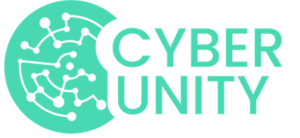
Cyberunity Project (H2022-101128024)
Community for Integrating and Opening Cyber Range Infrastructures that Build an Interoperable Cross-Domain and Cross-Sector Cyber Range Federation
1/01/2024 – 31/12/2026
HMU role in the project: Work Package Leader
Total Budget (EU contribution): € 3.594.528,04
Funding Scheme:
 Cyberunity
Cyberunity
CYBERUNITY targets the second objective of the DIGITAL-ECCC-2022-CYBER-03-CYBER-RESILIENCE -EU Cybersecurity Resilience, Coordination and Cybersecurity Ranges topic in the Call. Its main goal is to build an interoperable community of Cyber Ranges in Europe, initially by bringing together the cyber ranges owned and operated by the partners in the consortium, whilst “opening” the cyber range interoperability specifications for building and expanding a thriving community of cybersecurity experts, researchers and professionals. CYBERUNITY aims to contribute to the aim of making Europe a world leader, by developing open interoperability specifications and providing the first interoperable cyber range infrastructure. Building upon these, and upon additional components and interfaces to be developed and integrated within the project, the concept of the “Cyber-Range-as-a-Service” (CRaaS) will be realized. Additionally, the first overarching Knowledge Repository for cyber ranges will be developed. CYBERUNITY will deploy a secure framework that enables cross-organisation and cross-border trustworthy and privacy-compliant integrated cyber range services, whose capabilities will be demonstrated by means of several cross-border scenarios involving systems in critical sectors. During the lifecycle of the project, it is estimated that about 2000 cyber defenders from all regions of Europe, including those less equipped with a unified cyber range facility external users will benefit from CYBERUNITY.
Read More: cyberunity.eu/

Mine.io Project (Horizon EU-101091885)
A Holistic Digital Mine 4.0 Ecosystem
1/01/2023 – 30/6/2026
HMU role in the project: Task Leader
Total budget (EU contribution): € 11.999.256,00
Funding Scheme: Horizon – IA- Horizon Innovation Actions
 Mine.io
Mine.io
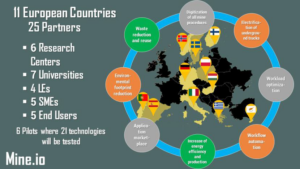
Read More: https://mineio-horizon.eu/

5D AeroSafe Project (H2020-861635)
5 Services of Drones for Increased Airports and Waterways Safety and Security
1/06/2020 – 31/05/2023
HMU role in the project: Task Leader
Total budget (EU contribution): € 3.497.475
Funding Scheme: RIA – Research and Innovation Action
 5D-Aerosafe
5D-Aerosafe
5D-AeroSafe is a 36-month project that will develop a set of drone-based services to increase the safety and security of airport and waterway, while reducing operational costs through the offering of five services:
- CNS/GNSS equipment inspection and calibration
- Security checks in the airport perimeter and approaches
- Runways and taxiways inspections
- Aircraft inspections
- Waterways operation and inspections
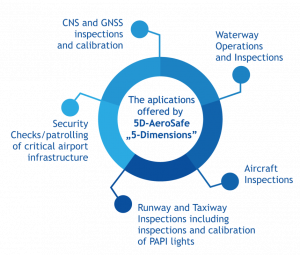
The challenge is to integrate the flight of drones in restricted areas where they will co-exist with numerous commercial flights without increasing risks. The integration UTM/ATM is thus studied in detail in the project to propose these efficient solutions. The services are based on the use of several drones (fixed wings for large area monitoring, and VTOLs for detailed inspections and calibrations) integrated in a generic ground station equipped with innovative ITC capabilities, connected to the airport legacy systems. The 5D-AeroSafe modules will be connected, via SWIM, to airport maintenance systems for infrastructure inspection and calibration aspects, operations systems for the aircraft inspections, and finally with the local ATM for the ATM/UTM integration aspects. The project will be implemented under the control of relevant end-users’ stakeholders (airport and water airport operators), and authorities (Civil Aviation Authorities). The tests and validation of the system will be performed through three operational test pilots at different stages of the project as the implementation will be incremental, and will take place in real locations and in as much as possible real conditions. As the technological and operational innovations are multiple, the project will target a final TRL of 6-7. The consortium and the advisory board encompass a large set of end-users and authorities which is a guaranty of the operationality of the project outcomes, and the industry and research partners have been involved for a long time in drone services development
Read More: https://5d-aerosafe.eu
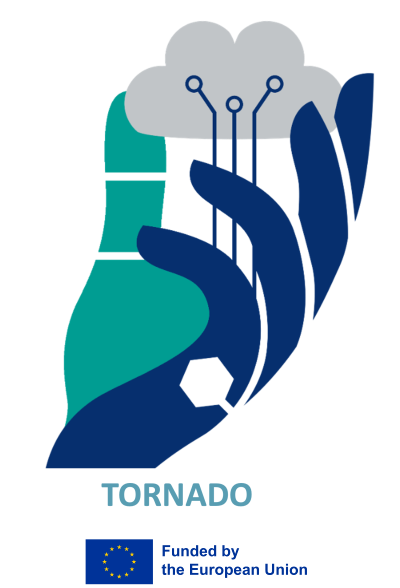
TORNADO Project (Horizon EU-101189557)
foundaTion mOdels for Robots that haNdle smAll, soft and Deformable Objects
01/01/2025 – 30/06/2028
HMU role in the project: Task Leader
Total budget (EU contribution): € 7.449.095,00
Funding Scheme: Horizon – RIA- Horizon Research &Innovation Actions
 TORNADO
TORNADO
TORNADO will develop an innovative, multifunctional and adaptive cloud robotics platform, supporting advanced navigation of an autonomous mobile robot (AMR) within complex, time-varying, real-world, human-populated indoor environments. The TORNADO AMR will be able to manipulate small, soft or deformable objects (SSDs) to an unprecedented degree of success, as well as to naturally interact with humans via hand gestures or verbal conversation, by exploiting the zero-shot generalization abilities of deep neural Foundation Models (FMs) for robotics. The AMR’s intelligence will rely on a pool of pretrained cloud-hosted FMs, which shall be further adjusted on-the-fly to the current situation via Out-of-Distribution Detection, Test-Time Adaptation and Few-Shot Adaptation subsystems. These will exploit human feedback if available, but will also support autonomous and dynamic cognitive adaptation. Additionally, the TORNADO system will be able to automatically select and set-up on-the-fly the most suitable combination of FMs and non-neural robotics algorithms during deployment, depending on the current situation. In cases of failure, on-the-fly skill acquisition will be supported via integrated, novel Learning-from-Demonstration methods facilitated by an innovative Augmented Reality (AR) interface and eXplainable AI (XAI) algorithms. The adaptive TORNADO system will allow the robot to perform difficult, non-repetitive manipulation tasks on previously unseen SSDs that may change shape during handling, as well as to flexibly adjust to SSDs of different sizes during operation. Measurement of human trust to interactive robots and human behavioral modeling will aid optimal integration/acceptance of TORNADO into society. Validation will take place at TRL-5 in 3 different industrial Use-Cases: flexible small gears manipulation and deformable ply-sheets handling (gears factory), palliative patient care (hospital) and product quality sampling/waste collection (dairy processing plant).
Read More: tornado-horizon.eu/

cPAID Project (Horizon EU-101168407)
Cloud-based Platform-agnostic Adversarial aI Defence framework
01/10/2024 – 30/09/2027
HMU role in the project: Task Leader
Total budget (EU contribution): € 5.514.912,50
Funding Scheme: Horizon – RIA- Horizon Research &Innovation Actions
 cPAID
cPAID
cPAID envisions researching, designing, and developing a cloud-based platform-agnostic defense framework for the holistic protection of AI applications and the overall AI operations of organizations against malicious actions and adversarial attacks. cPAID aims at tackling
both poisoning and evasion adversarial attacks by combining AI-based defense methods (e.g., life-long semi-supervised reinforcement learning, transfer learning, feature reduction, adversarial training), security- and privacy-by-design, privacy-preserving, explainable AI
(XAI), Generative AI, context-awareness as well as risk and vulnerability assessment and threat intelligence of AI systems. cPAID will identify guidelines to a) guarantee security- and privacy-by-design in the design and development of AI applications, b) thoroughly assess the robustness and resiliency of ML and DL algorithms against adversarial attacks, c) ensure that EU principles for AI ethics have been considered, and d) validate the performance of AI systems in real-life use case scenarios. The identified guidelines aspire to promote research toward developing certification schemes that will certify the robustness, security, privacy, and ethical excellence of AI applications and systems.
Read More: cpaid.eu/
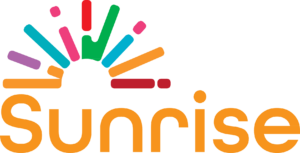
Sunrise Project (Horizon EU-101136829)
SUstaiNable inteRventions and healthy behavIours for adoleScent primary prEvention of cancer with digital tools
1/01/2024 – 30/04/2028
HMU role in the project: Work Package Leader
Total budget (EU contribution): € 5.999.408,75
Funding Scheme: Horizon – IA- Horizon Innovation Actions
 Sunrise
Sunrise
Primary prevention of cancer through behaviour changes in adolescence – a critical period in which many risk behaviours are initiated –, is a huge health and societal challenge in Europe. In alignment with this need, SUNRISE will co-create, implement and evaluate an innovative digitally-enhanced life-skills programme for primary prevention of cancer through sustainable health behaviour change in adolescents, tailored to their socio-economic, cultural and environmental diversities. SUNRISE will combine an established, evidence-based digital solution for smoking prevention, with novel intervention approaches such as peer social media campaigns, advertising literacy training, educational games, and social robot platforms, to take cancer prevention approaches for adolescents in the EU to the next level. The digitally-enhanced programme and its components will be developed through co-creation with schools-as-living-labs methods involving multiple societal actors such as educators, adolescents, parents, public health experts, and policy-makers. The programme will be implemented and evaluated at large scale across 154 schools and 7500 students in urban and rural regions of 8 European countries – Greece, Switzerland, Slovenia, Spain, Cyprus, Italy, Belgium, Romania -, including socially disadvantaged groups such as migrants and ethnic minorities. The effectiveness of both methods for achieving long-term health behaviour change, as well as the implementation strategy for solution adoption and multi-country sustainability, will be evaluated. This action is part of the Cancer Mission cluster of projects on “Prevention & early detection (behavioural change).
Pasiphae Lab participates in the EU-funded SUNRISE project, under the auspices of the Hellenic Mediterranean University.
Read More: thesunriseproject.eu/

COBALT Project (H2022-101119602)
Certification for Cybersecurity in EU ICT using Decentralized Digital Twinning
1/11/2023 – 31/10/2026
HMU role in the project: Task Leader
Total Budget (EU contribution): € 4.996.405,63
Funding Scheme: Horizon-IA – Horizon Innovation Actions
 COBALT
COBALT
COBALT proposes the introduction of a Common Certification Model (CCM) for European industries, leveraging existing standards and composing a unified cybersecurity namespace for ICT processes. The proposal will uphold the paradigm of Digital Twinning (DT) via the creation of Digital Threads and extend it in a vertical agnostic approach across different industries, including Quantum computing (involving FHG’s Quantum Computer) and I4.0. The COBALT DT will explore technology disruption mainly focusing on AI and High-Performance Computing (HPC) via the analysis and certification of Quantum Processing Oracles (a Quantum Computer exposure operation that is used as input to another algorithm), and how different enablers of these paradigms can be certified in a vertical agnostic manner. Quantum is destined to play a pivotal role in Europe’s AI and Computing sovereignty, thus protecting such infrastructure and its relevant processes (Quantum Oracles), should be of top priority. Along with common information models, COBALT acknowledges the importance of trusted information exchange a critical feature for an effective certification process across different industries, especially regarding cybersecurity. Therefore, COBALT will focus on the integration of International Data Spaces (IDS) primitives as a basis for the data sharing platform across different stakeholders. IDS currently proposes different models and procedures to share information and data across different spaces in a trusted manner between two parties, this can facilitate the process to build a trusted end-to-end certification framework across different industry stakeholders. Finally, COBALT aims to build a decentralized solution to further accelerate technology adoption and harmonization for the different use cases to be adopted. For the proposed CCM to function as a long term and sustainable European solution for certification, it needs to adapt and flex according to different environment conditions.
Read more: https://horizon-cobalt.eu/

TRUSTEE Project (H2021-101070214)
Trust and Privacy Preserving Computing Platform for Cross Border Federation of Data
1/07/2022 – 31/12/2025
HMU role in the project:
Technical Coordinator & Work Package Leader
Total Budget (EU contribution): € 8.706.263.75
Funding Scheme: RIA – Research and Innovation Action
 Trustee
Trustee
As we live in a data-driven era, the emergence of interdisciplinary, geographically dispersed, data repositories, is inevitable. The fact that these repositories do not necessarily abide with existing interdisciplinary data representation standards, nor do they necessarily belong to any data federation initiative, renders them unusable, since researchers cannot easily access this data. Moreover, most of thetimes, integrity, privacy, and security in such interactions is either very difficult, or impossible to maintain.
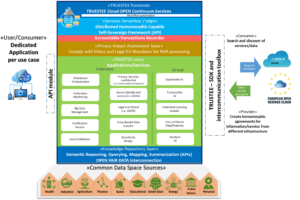
Towards this end, TRUSTEE aims to bring a green, secure, trustworthy, and privacy-aware framework that will aggregate various interdisciplinary data repositories, such as Healthcare, Education, Energy, Space, Automotive, Cross-border etc. and also consider other European data federation spaces and trans-national initiatives, such as Gaia-X and EOSC. TRUSTEE will offer a secure-by-design framework, wherein stored data is homomorphically encrypted, thus offering researchers:
- Ability to search and use data in the encrypted domain
- A unified and meaningful FAIR representation of data, in an open and fair manner
- Complex and context-aware queries through advanced ontologies
- Data processing and analysis through transparent trustworthy ML workflows,over an intuitive AI playground, which will promote AI eXplainability, interoperability, and re-usability, by utilizing state of the art methods and paradigms
- Compliance with European privacy and ethical frameworks, e.g., GDPR, PIA, etc.
- Enforce privacy by applying a Homomorphic encryption layer, through which all data interaction will take place
- A blockchain-based transaction recorder to ensure accountability
TRUSTEE’s fully encryptedsolution will be validated through six different use cases supporting GAIA-X, EOSC, EGI, etc. demonstrating a multi-d
Read More: http://horizon-trustee.eu/
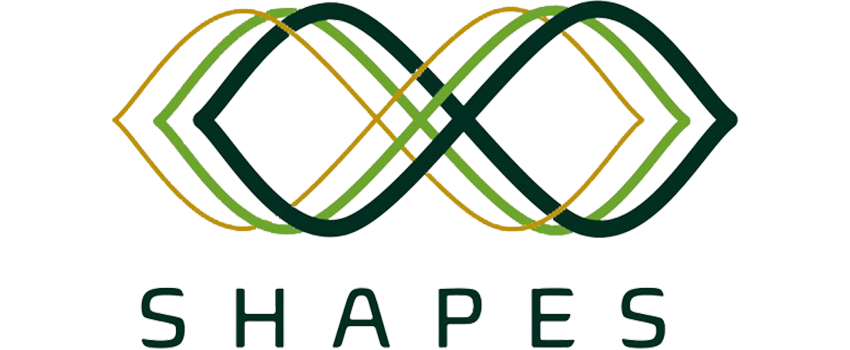
Shapes Project (H2020 - 857159)
Smart and Healthy Ageing through People Engaging in Supportive Systems
1/11/2019 – 31/12/2023
Coordinator: National University of Ireland Maynooth
Total budget (EU contribution): € 18.732.468,25
Funding Scheme: IA – Innovation action
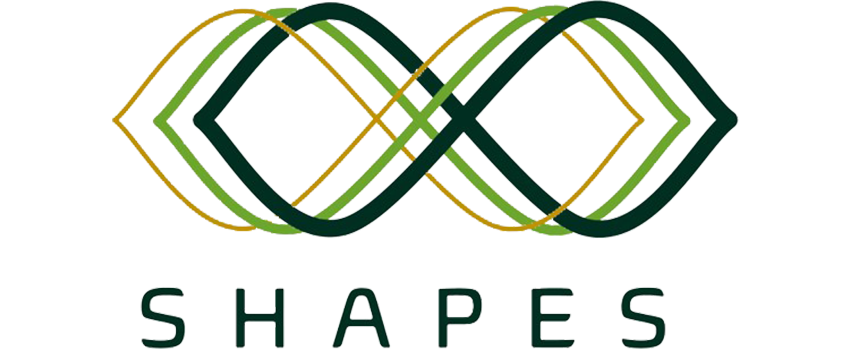 SHAPES
SHAPES
SHAPES aims to create the first European open Ecosystem enabling the large-scale deployment of a broad range of digital solutions for supporting and extending healthy and independent living for older individuals who are facing permanently or temporarily reduced functionality and capabilities. SHAPES builds an interoperable Platform integrating smart digital solutions to collect and analyse older individuals’ health, environmental and lifestyle information, identify their needs and provide personalized solutions that uphold the individuals’ data protection and trust.
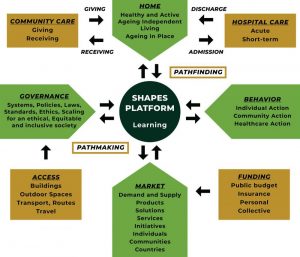
Standardisation, interoperability and scalability of SHAPES Platform sustain increased efficiency gains in health and care delivery across Europe, bringing improved quality of life to older individuals, their families, caregivers and care service providers. SHAPES Large-scale Piloting campaign engages +2k older individuals in 15 pilot sites in 10 EU Member States, including 6 EIP on AHA Reference Sites, and involves hundreds of key stakeholders to bring forth solutions to improve the health, wellbeing, independence and autonomy of older individuals, while enhancing the long-term sustainability of health and care systems in Europe.
SHAPES’s multidisciplinary approach to large-scale piloting is reflected across 7 themes that, together, provide a clear understanding of the reality of European health and care systems and enable the validation of cost-efficient, interoperable and reliable innovations capable of effectively supporting healthy and independent living of older individuals within and outside the home. Building an ecosystem attractive to European industry and policy-makers, SHAPES develops value-based business models to open and scaleup the market for AHA-focused digital solutions and provides key recommendations for the far-reaching deployment of innovative digital health and care solutions and services supporting and extending healthy and independent living of older population in Europe.
Read More: https://shapes2020.eu/
